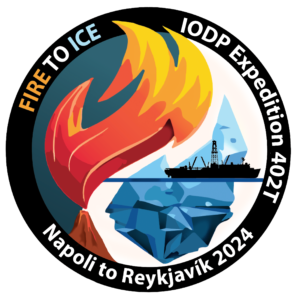Announcing the JR Academy 2024
for Undergraduate Students in the U.S., Australia and New Zealand
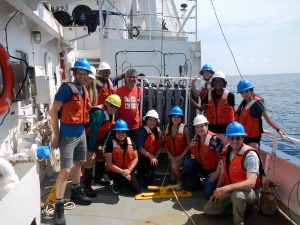
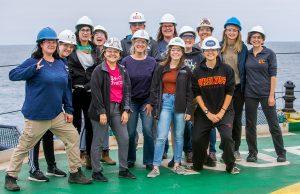

A very special opportunity for undergraduate students during Spring 2024!
What: Sail aboard the amazing U.S. vessel for scientific ocean drilling, the JOIDES Resolution (the JR) on a transit from Italy to Iceland. During Expedition 402T, the JR will host our third JR Academy. The JR Academy provides an opportunity for undergraduate students to live and work aboard the ship, while learning about scientific ocean drilling, the exciting geoscience careers that surround it, and in this instance, a chance to use STEAM and science communication to explore bridging Indigenous and Western sciences. In addition to learning many aspects of Earth science through workshops, lectures and land-based field trips, students will learn about and conduct projects on science communication, sharing their science and arts with their schools and communities back home.
This JR Academy is being run in collaboration with our partners from Australia and New Zealand (ANZIC) and is a unique opportunity that might not be offered again any time soon! To learn more about the JR, explore here.
IODP acknowledges and respects the diverse First Nations Peoples worldwide, whose enduring connections to the seas and deep-time geology enrich our understanding of our Earth’s processes and history. In our global pursuits, we commit to the respectful acknowledgment of traditional waters, cultures, and the vital role of First Nations Peoples in science, storytelling, meetings, and symbols, fostering inclusion and ending historical exclusion. As we extend our respect to our ancestors and descendants, IODP values the invaluable contributions of First Nations Peoples to global society and, pays homage to Elders past, present and emerging.
When: Arrive in Naples, Italy April 8th and embark the vessel on April 10th; disembark the vessel April 25th in Reykjavik, Iceland. Two days both pre-embarkation and post-disembarkation may be programmed for land-based field trips.
Ports: Board in Naples, Italy; disembark in Reykjavik, Iceland
Who is Eligible:
- Must be at least 18 years old and enrolled in or accepted to an accredited institution of higher learning in the U.S., Australia or New Zealand; Students from underrepresented groups in the geosciences, indigenous communities, community colleges and first generation university students are especially encouraged to apply. Australian students must be able to provide a letter from an Aboriginal or Torres Strait Islander Community or Organisation where you identify and are accepted. New Zealand students should provide confirmation of Māori ancestry, such as an iwi registration document or a screen shot of relevant details from your university’s registration portal.
- Must hold, or be able to obtain a passport and appropriate visas for the duration of the program and destinations.
- Must be comfortable in a somewhat unpredictable environment.
- Must be in generally good health and complete a required medical exam (form will be provided).
- Must be able to work in close quarters at sea.
Cost: All travel costs are covered by the U.S. Science Support Program (for U.S. participants) and by IODP ANZIC for Australian and New Zealand participants.
Airfare to/from the ports or hotel while in port during the official program days will be covered for you, although there are some minor costs (such as taxis) that you may need to cover initially, and will then get reimbursed later. You will need to pay for your own required medical physical as well as any passport fees (if you don’t already hold a current passport).
Participants may be eligible for payment in exchange for carrying out post-expedition science communication projects.
What will I be doing?
- Living and working aboard the U.S. vessel for scientific ocean drilling
- Engaging in lab, lecture and hands-on activities relating to introductory oceanography and Earth science while on board a floating at-sea laboratory
- Interacting with scientists, crew and technical staff who support IODP missions on the JR
- Learning valuable and creative science communication techniques; conducting live ship-to-shore broadcasts
- Participating in shipboard operations as appropriate
- Creating and starting an on-board science communication project that will completed later in the year
- Blogging and participating in JR social media channels
How do I apply? Complete an application here by January 7, 2024.
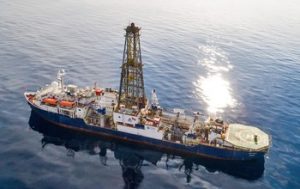
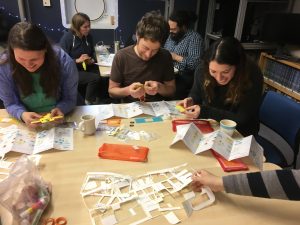

Questions: Sharon Cooper: scooper@ldeo.columbia.edu or Carol Cotterill: ccotterill@ldeo.columbia.edu
Read about the 2023 JR Academy here!
————————————————————————————————————————————————-
FAQ
Can high school students apply?
Students who have graduated from high school, are already 18 years old and plan to enroll at a 2-year or 4-year institution in the coming year may apply.
I am not a U.S. citizen but attend a U.S. university/college. Am I eligible?
Unfortunately, no. You must be a U.S. citizen, U.S. national OR permanent resident. Applicants from Australia or New Zealand do not require you to be national or permanent resident to apply.
I am studying in Australia or New Zealand, and my university isn’t an ANZIC member institute. Can I still apply?
Yes! For this activity, this call is open to all undergraduates studying at any Australian or New Zealand universities.
I am a U.S. citizen but attend an accredited institution in another country. Am I eligible?
For U.S. applicants, yes. However, ANZIC applicants only require you to be studying in Australia or New Zealand.
I am from a country other than the U.S., Australia or New Zealand – am I eligible?
No, this particular JR Academy is only for the students from these three countries.
Are graduate students eligible?
No, this program is specifically for undergraduates.
I get sick easily on buses, trains and planes. Should I apply? Will I get seasick?
The JR is a pretty stable ship. However, a lot of students/scientists do get seasick the first day or two; for most, it goes away after that. If you are prone to motion sickness in general, please consider if this is the right opportunity for you. Many people who sail on the JR bring some motion sickness medication, either over the counter or in consultation with their doctor. There is also a doctor on board 24/7 who can assist you with any issues that arise.
